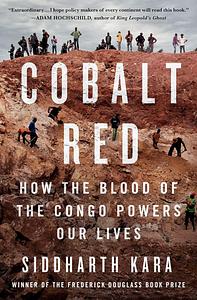Take a photo of a barcode or cover
Graphic: Child death, Death, Genocide, Gore, Gun violence
Moderate: Physical abuse, Racism, Rape, Sexual assault, Sexual violence, Slavery, Torture, Xenophobia, Medical content, Kidnapping, Murder, Sexual harassment, War, Injury/Injury detail
I truly hope everyone reads this book and all the other references given inside of it. Amazing research work.
Siddharth Kara investigates the worst crimes against humanity. "Cobalt Red: How the Blood of the Congo Powers Our Lives" is his 2023 book exposing how mining and technology industries globally exist because of child slavery, slavery, violence and abuse in the Eastern Democratic of Congo. The artisanal mining industry as it exists should be abolished and overhauled with safer and better systems for tech development.
It feels impossible to rate a book this personal and tragic. The effort it takes to speak to this many people is nothing short of remarkable. Each of the Congolese civilians who recounted how their lives are being destroyed for an iPhone or a laptop to remain rechargeable deserve so much more than a book review and rating. They deserve action that substantially changes their lives.
I think this is worth reading as one of very few modern accounts on the pillage of the Eastern Democratic of Congo by mining and tech corporations such as Apple, Google, Tesla, Dell, and so forth. Once again, an abolition movement is required to end the enslavement of Africa's people at the hands of Western imperial governments, not limited to but including the USA, Canada, China, The United Kingdom, Australia and France.
I read this book because I wanted to understand if the author had tracked any solutions or ways to assist the millions of people made captive by this atrocity. While it was a thorough account of the atrocities committed against the Democratic Republic of Congo, and the history of Belgian and French colonisation, I do wish a few chapters were dedicated to solution oriented work. I understand there is likely a reason for this absence and won't cast too much judgement for this.
Personally, I wish there was a safe and efficient way to support the work of the grassroots movements beyond financial donations. Kara spoke to a few grassroots groups - for example, three University of Lumbumbashi students, Gloria, Joseph and Reine organising efforts to support artisanal mining communities. Their work is a vital way to begin change by funding their efforts and supporting them in any attempts to speak to lobbies or with the corporation responsible, or present reports or submission in front of international bodies like the UN.
Nonetheless, it is vital for people to have a better understanding of what "Free Congo" means and involves, and this book can help do that. I do recommend it if you require a literary tool to assist your advocacy for ending one of the modern day slave trades occurring today.
A minor issue I did have: I wish the author had quoted and sanitised Joseph Conrad and David Livingstone significantly less.
ALSO - EAT THE RICH!
Graphic: Child abuse, Child death, Death, Genocide, Gun violence, Pedophilia, Physical abuse, Racism, Rape, Sexism, Sexual assault, Sexual violence, Slavery, Torture, Violence, Blood, Medical content, Trafficking, Grief, Medical trauma, Death of parent, Murder, Pregnancy, Sexual harassment, Colonisation, War







